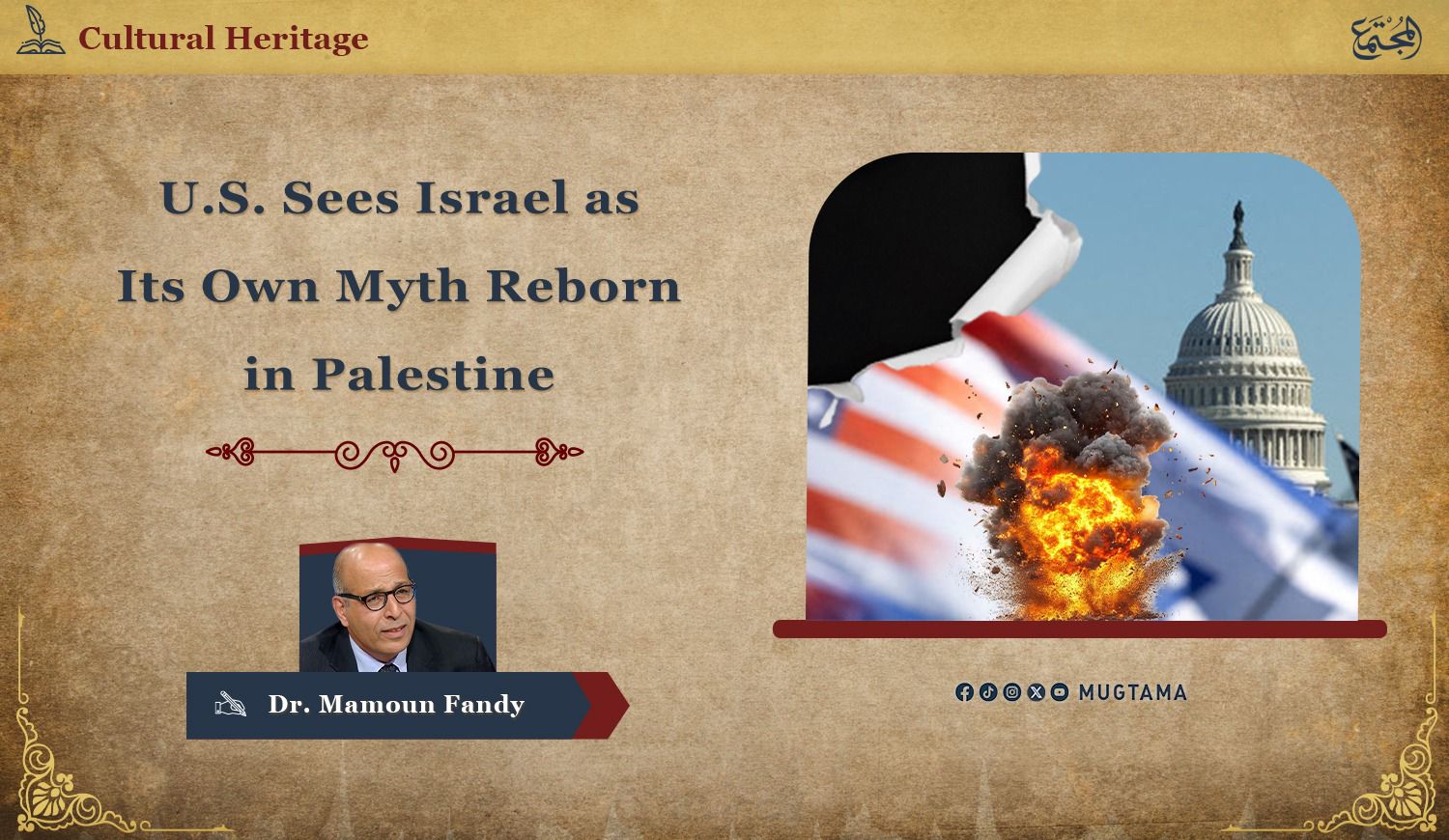U.S. Sees Israel as Its Own Myth Reborn in Palestine

Despite the rising death toll in Palestine,
and despite the undeniable strategic importance of the Arab world to American
interests—as a vast consumer market and a vital source of energy for Western
civilization—the United States continues to endorse Israel’s most extreme and
humiliating policies toward Arab peoples and governments. The question is
urgent and unavoidable: Why does America support Israel so unconditionally?
Why does it ignore the legitimate rights of Arabs and Muslims?
The answer lies in two interwoven
dimensions:
1. A historical-cultural dimension rooted
in America’s own national identity and mythmaking.
2. A political-organizational dimension
reflecting the fragmented coordination between Arab governments and their
people.
America’s Founding Myth: A Zionist Parallel
To understand the historical roots of America’ssupport for Israel, we must revisit the foundational narrative of the
American state. Before Columbus arrived, and prior to the migration of Puritan
groups from Britain, the land that would become the United States was inhabited
by Indigenous peoples—tribal societies with distinct customs and governance
structures. These peoples were erroneously labeled “Red Indians,” and they
governed their territories through tribal systems.
When Protestant Christian
groups—calling themselves Puritans or “the purified”—arrived in Plymouth (1636)
and Massachusetts (1650), they brought with them a collective mythology. They
saw themselves as the people of Moses, fleeing the tyranny of the English
Pharaoh. Their worldview was steeped in Hebraic allegory. America, to them, was
the Promised Land, a “city upon a hill” destined to illuminate the path
for all humanity.
They believed they were God’s
chosen people, entrusted with a divine mission. The Indigenous population,
in their eyes, were the Canaanites—those whom God had commanded them to
annihilate. This belief system justified a genocidal campaign against Native
Americans. The Puritans felt no guilt; they saw extermination as obedience to
divine will.
As the American state consolidated
power, it signed treaties with Native tribes—most of which were later broken.
The few that remained confined Indigenous peoples to isolated reservations
under federal control. Once dominant, Native Americans were reduced to
marginalized communities plagued by disease and social decay, their numbers
dwindling year by year.
The American state was born as a new
Zion, built on the myth of divine chosenness and the extermination of the
“Canaanite” other. If this myth is foundational to America’s identity, how can
Americans demand its dismantling elsewhere—in Israel?
America was built on the same
ideological scaffolding as Zionism. Asking Americans to reject Israel’s Zionist
vision is, in effect, asking them to reject their own origin story.
This historical memory creates a
cognitive barrier for Americans when confronting the Palestinian issue. Instead
of seeing the reality of Israeli expansionism and settlement policies, they
revert to myth: Israelis become the Puritan forefathers, Palestinians the
Native “Canaanites.” This lens fosters sympathy for Israel among both ordinary
citizens and intellectuals.
Oslo and the Reservation Model
This mythic framework shaped America’s
vision for Palestinian autonomy—from the Rogers Plan in the 1960s to CampDavid in the 1970s, and later Oslo I and II. In every case,
Palestinians were offered a model akin to Native American reservations:
isolated enclaves under full Israeli control in defense and foreign affairs.
This vision clashed with Yasser
Arafat’s aspiration for a sovereign Palestinian state with Jerusalem as its
capital. But unlike South Africa—another state built on the myth of divine choosiness—where
Mandela led the oppressed to victory, Arafat was no Mandela.
The American proposals for Palestinian
self-rule consistently mirrored the reservation system: limited autonomy, no
control over borders, defense, or foreign policy, and full subordination to
Israeli oversight. This was not a vision of statehood—it was a vision of
containment.
Breaking the Myth: A Call for Intellectual Engagement
To challenge this entrenched myth,
Arab intellectuals must engage American thinkers and policymakers in a
multi-dimensional dialogue. They must expose the mythological lens through
which Americans view the MiddleEast and replace it with historical and political realities.
This myth doesn’t only distort views
on Palestine and Israel—it also shapes perceptions of Islamic revival. American
policymakers equate Islamic movements with Puritan expansionism, imagining
Islamists as seeking to replicate the American model: conquest, state-building,
and extermination of the “other.”
It is vital to clarify that
Palestinians are not Native Americans, and Islamists are not Puritans. Arab
intellectuals must master American history and society to avoid falling into
the same mythic traps.
The Mirage of a Palestinian State
Unless we confront these
epistemological challenges, we will remain dreamers chasing a Palestinianstate, while the reality offered is nothing more than reservations.
America’s cultural and historical entanglement with Zionism is not the sole
explanation—Arab disunity plays a major role.
Arab Fragmentation and Israeli Strategy
1. The Power of Collective Action:
In 1973, a unified Arab oil embargo forced the West to concede. But over time, narrow self-interest fractured Arab unity. Even revolutionary groups claiming to protect national interests succumbed to fragmentation. Arafat entered secret Oslo talks, and King Hussein signed peace with Israel without Arab coordination. These moves benefited Israel more than Palestine.2. Israeli Success in Dividing the Arab Front:
Oslo saw Palestinians abandon UNResolutions 242 and 338, and the principle of land-for-peace. Israel not only fractured Arab unity but undermined the Madrid framework. U.S.-Israeli policy convinced Arab leaders that their true enemy was their own people—not Israel. Islam became the threat, not Israeli nukes or settlements.This intellectual confusion and
America’s myth-driven worldview explain the persistent U.S. bias toward Israeli
aggression.
The American Psyche and the Palestinian Struggle
The American psyche, shaped by its own
myth of divine conquest, finds it difficult to sympathize with Palestinians.
Instead of engaging with the facts on the ground—settlement expansion, military
occupation, and systemic dispossession—Americans revert to their foundational
narrative. Israelis become the modern-dayPuritans, and Palestinians the “Canaanites” to be contained, erased, or
confined to reservations.
This mythic lens influences not only
public opinion but also policy. It explains why American proposals for
Palestinian autonomy resemble the reservation system imposed on Native
Americans. It explains why Palestinians are offered limited self-rule under
Israeli control, rather than full sovereignty.
The Role of Arab Intellectuals
To dismantle this myth, Arab
intellectuals must engage American counterparts in serious dialogue. They must
challenge the mythic framework and present a reality-based understanding of the
region. This requires deep knowledge of American history, culture, and
political psychology.
It is not enough to counter myth with
myth. Arab intellectuals must avoid the trap of responding to American
narratives with their own historical nostalgia. Instead, they must present
facts, build relationships, and reshape perceptions.
Conclusion: Toward a New Understanding
If we fail to confront these cultural
and epistemologicalchallenges, we will remain trapped in a cycle of disappointment. The
promise of a Palestinian state will remain a mirage, and the reality will be
one of reservations, containment, and erasure.
America’s support for Israel is not
merely political—it is cultural, historical, and psychological. To change this,
we must change the narrative. We must engage, educate, and expose the myth for
what it is.
Only then can we hope to build a
future where justice is not confined to myth, and where Palestine is not
treated as a modern-day reservation.
--------------------
Published in issue no. 1220 of Al-Mujtama magazine (Kuwait), 25 Jumada al-Awwal 1417 AH / 8 October 1996, p. 44.











